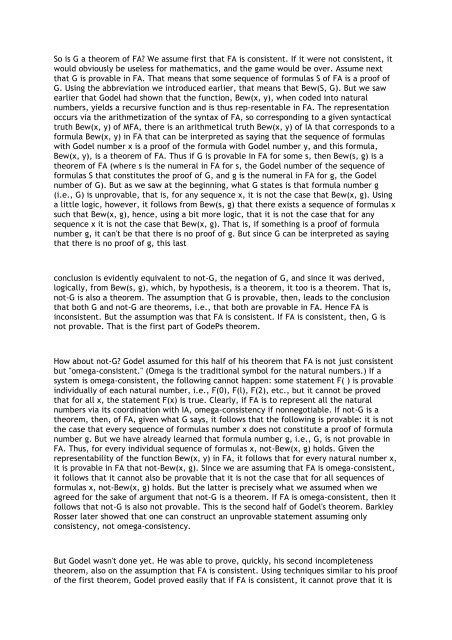Yourgrau P. A world without time.. the forgotten legacy of Goedel and Einstein (Basic Books, 2005)(ISBN 0465092934)(176s)_PPop_
Yourgrau P. A world without time.. the forgotten legacy of Goedel and Einstein (Basic Books, 2005)(ISBN 0465092934)(176s)_PPop_
Yourgrau P. A world without time.. the forgotten legacy of Goedel and Einstein (Basic Books, 2005)(ISBN 0465092934)(176s)_PPop_
You also want an ePaper? Increase the reach of your titles
YUMPU automatically turns print PDFs into web optimized ePapers that Google loves.
So is G a <strong>the</strong>orem <strong>of</strong> FA? We assume first that FA is consistent. If it were not consistent, it<br />
would obviously be useless for ma<strong>the</strong>matics, <strong>and</strong> <strong>the</strong> game would be over. Assume next<br />
that G is provable in FA. That means that some sequence <strong>of</strong> formulas S <strong>of</strong> FA is a pro<strong>of</strong> <strong>of</strong><br />
G. Using <strong>the</strong> abbreviation we introduced earlier, that means that Bew(S, G). But we saw<br />
earlier that Godel had shown that <strong>the</strong> function, Bew(x, y), when coded into natural<br />
numbers, yields a recursive function <strong>and</strong> is thus rep-resentable in FA. The representation<br />
occurs via <strong>the</strong> arithmetization <strong>of</strong> <strong>the</strong> syntax <strong>of</strong> FA, so corresponding to a given syntactical<br />
truth Bew(x, y) <strong>of</strong> MFA, <strong>the</strong>re is an arithmetical truth Bew(x, y) <strong>of</strong> IA that corresponds to a<br />
formula Bew(x, y) in FA that can be interpreted as saying that <strong>the</strong> sequence <strong>of</strong> formulas<br />
with Godel number x is a pro<strong>of</strong> <strong>of</strong> <strong>the</strong> formula with Godel number y, <strong>and</strong> this formula,<br />
Bew(x, y), is a <strong>the</strong>orem <strong>of</strong> FA. Thus if G is provable in FA for some s, <strong>the</strong>n Bew(s, g) is a<br />
<strong>the</strong>orem <strong>of</strong> FA (where s is <strong>the</strong> numeral in FA for s, <strong>the</strong> Godel number <strong>of</strong> <strong>the</strong> sequence <strong>of</strong><br />
formulas S that constitutes <strong>the</strong> pro<strong>of</strong> <strong>of</strong> G, <strong>and</strong> g is <strong>the</strong> numeral in FA for g, <strong>the</strong> Godel<br />
number <strong>of</strong> G). But as we saw at <strong>the</strong> beginning, what G states is that formula number g<br />
(i.e., G) is unprovable, that is, for any sequence x, it is not <strong>the</strong> case that Bew(x, g). Using<br />
a little logic, however, it follows from Bew(s, g) that <strong>the</strong>re exists a sequence <strong>of</strong> formulas x<br />
such that Bew(x, g), hence, using a bit more logic, that it is not <strong>the</strong> case that for any<br />
sequence x it is not <strong>the</strong> case that Bew(x, g). That is, if something is a pro<strong>of</strong> <strong>of</strong> formula<br />
number g, it can't be that <strong>the</strong>re is no pro<strong>of</strong> <strong>of</strong> g. But since G can be interpreted as saying<br />
that <strong>the</strong>re is no pro<strong>of</strong> <strong>of</strong> g, this last<br />
conclusion is evidently equivalent to not-G, <strong>the</strong> negation <strong>of</strong> G, <strong>and</strong> since it was derived,<br />
logically, from Bew(s, g), which, by hypo<strong>the</strong>sis, is a <strong>the</strong>orem, it too is a <strong>the</strong>orem. That is,<br />
not-G is also a <strong>the</strong>orem. The assumption that G is provable, <strong>the</strong>n, leads to <strong>the</strong> conclusion<br />
that both G <strong>and</strong> not-G are <strong>the</strong>orems, i.e., that both are provable in FA. Hence FA is<br />
inconsistent. But <strong>the</strong> assumption was that FA is consistent. If FA is consistent, <strong>the</strong>n, G is<br />
not provable. That is <strong>the</strong> first part <strong>of</strong> GodePs <strong>the</strong>orem.<br />
How about not-G? Godel assumed for this half <strong>of</strong> his <strong>the</strong>orem that FA is not just consistent<br />
but "omega-consistent." (Omega is <strong>the</strong> traditional symbol for <strong>the</strong> natural numbers.) If a<br />
system is omega-consistent, <strong>the</strong> following cannot happen: some statement F( ) is provable<br />
individually <strong>of</strong> each natural number, i.e., F(0), F(l), F(2), etc., but it cannot be proved<br />
that for all x, <strong>the</strong> statement F(x) is true. Clearly, if FA is to represent all <strong>the</strong> natural<br />
numbers via its coordination with IA, omega-consistency if nonnegotiable. If not-G is a<br />
<strong>the</strong>orem, <strong>the</strong>n, <strong>of</strong> FA, given what G says, it follows that <strong>the</strong> following is provable: it is not<br />
<strong>the</strong> case that every sequence <strong>of</strong> formulas number x does not constitute a pro<strong>of</strong> <strong>of</strong> formula<br />
number g. But we have already learned that formula number g, i.e., G, is not provable in<br />
FA. Thus, for every individual sequence <strong>of</strong> formulas x, not-Bew(x, g) holds. Given <strong>the</strong><br />
representability <strong>of</strong> <strong>the</strong> function Bew(x, y) in FA, it follows that for every natural number x,<br />
it is provable in FA that not-Bew(x, g). Since we are assuming that FA is omega-consistent,<br />
it follows that it cannot also be provable that it is not <strong>the</strong> case that for all sequences <strong>of</strong><br />
formulas x, not-Bew(x, g) holds. But <strong>the</strong> latter is precisely what we assumed when we<br />
agreed for <strong>the</strong> sake <strong>of</strong> argument that not-G is a <strong>the</strong>orem. If FA is omega-consistent, <strong>the</strong>n it<br />
follows that not-G is also not provable. This is <strong>the</strong> second half <strong>of</strong> Godel's <strong>the</strong>orem. Barkley<br />
Rosser later showed that one can construct an unprovable statement assuming only<br />
consistency, not omega-consistency.<br />
But Godel wasn't done yet. He was able to prove, quickly, his second incompleteness<br />
<strong>the</strong>orem, also on <strong>the</strong> assumption that FA is consistent. Using techniques similar to his pro<strong>of</strong><br />
<strong>of</strong> <strong>the</strong> first <strong>the</strong>orem, Godel proved easily that if FA is consistent, it cannot prove that it is


